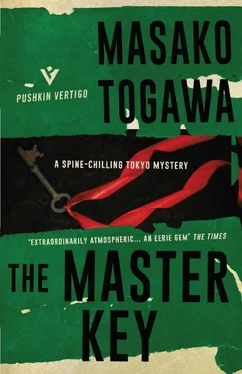For instance, she would recollect how Miss A would freeze to attention, standing to one side, whenever Miss Kimura passed her in the school corridor. Or there was her memory of Miss B, one of her favourite pupils, whom she had caught skylarking with a junior girl on the station platform. The girl had been so embarrassed that she had hidden herself in the Station Master’s office! To her, such memories were full of poignant interest.
This was not, however, necessarily the reaction of the recipients of her letters, now mature women, who were thus abruptly brought face to face with memories of their youthful immaturity. Not all of them found Miss Kimura’s recollections as welcome as she would have wished. These spectres of their past were suddenly produced, as if on film, before their very eyes, and most of the recipients found her letters distasteful or even shocking and did not vouchsafe replies.
A few, however, found the experience of value in helping them reflect on their personalities past and present. All of them had the same points in common; like their former teacher, they were living alone and were suffering from a feeling of spiritual oppression. For all of them, the prospects ahead seemed dark or non-existent, and only the past had any real meaning or comfort. Like her, they led secret lives apart from the real world.
When she had written exactly seven hundred such letters, the lot fell upon one Keiko Kawauchi (b. 1930). Yoneko Kimura had been her class teacher for the two years preceding graduation—and those were the two years immediately following Japan’s wartime defeat, when society was in a turmoil and all the old values were being questioned. Naturally, the former educational system was also being reviewed and revised at the same time.
The older teachers like Yoneko found some of the educational reforms that were being imposed on Japan by the Occupation Forces very hard to stomach. Until the textbooks could be reprinted, they had to go through them inking out passages reflecting militaristic or nationalistic thinking. Also, they had to reduce in number, and sometimes simplify in form, the Chinese characters they had been accustomed to teach in the past. The students soon sensed the uncertainty of their teachers who had for so long reigned inviolate from their raised dais, to whom the new word ‘Liberty’, with its effects overflowing into the classroom, began to assume repulsive connotations. Yoneko made just one attempt to recover her former dignity and state, and that had concerned Keiko Kawauchi. Most of the girls came to school in black cotton stockings. Some of the girls didn’t have them, but most of the girls in the senior classes, the nubile ones, wore their uniform and black cotton stockings even though it was still a time of shortages and drab clothes in Japan. There was just one girl who was different—Keiko, who wore nylon stockings to school. Later on she had her imitators, but she was the first, and such clothes could only be obtained at great price through the black market. Seeing Keiko’s shapely legs glittering in the smooth nylons, Yoneko’s rage boiled up and overflowed. What angered her even more was the unladylike way in which Keiko sat with one thigh crossed over the other, as if to show off her legs and her stockings—such conduct in a young Japanese girl had been unthinkable before the coming of the Occupation Forces. Looking back on the incident, Yoneko now wondered why she had worked herself up so much over a trivial detail, but at that time it had seemed a matter of great moment.
In fact, those nylon stockings were like the proverbial straw that broke the camel’s back, and Yoneko’s outburst of wrath merely reflected her deep dissatisfaction with the changes going on around her. Here was a threat, it seemed to her, to the whole structure of Japanese womanliness and morality, and it had to be faced head on. In stern tones, she rebuked the girl in front of the rest of the class, making it quite clear that nylon stockings were forbidden at school.
She had expected Keiko, after such public humiliation, to stay away from school for a day or two. In fact, she had herself begun to regret her over-reaction. But to the contrary, Keiko showed up at school the next day—still wearing nylon stockings. There were several other girls who, like Keiko, came from families which were prospering illicitly or indecently amidst the general ruin of the country, and these were the first to imitate her example. After a short while, all the girls in the class followed suit, until nylon stockings more or less became the fashion with school uniform. Yoneko came to realise that she no longer possessed the power to influence these adolescents of the postwar era, and accepted her defeat for want of any other course of action. The question was raised once at a teachers’ conference, together with the new trend of schoolgirls growing their hair long, a thing formerly forbidden. All the teachers had to accept that their authority was diminished and that there was nothing to be done about such issues.
Keiko had graduated whilst the resentment of this incident still lay coiled in Yoneko’s breast. Before her graduation, the school rustled with rumours that her elder sister had become a prostitute serving the needs of the US troops, but Keiko displayed no reaction whatever.
Yoneko’s subsequent detailed knowledge of Keiko’s career was based on the newspaper articles she had read at the time of the famous kidnapping incident seven years before. After leaving school, Keiko had gone to work in the Ginza PX, and within six months had married an American officer some fifteen years older than herself. At the time, Yoneko had felt that an evil fate seemed to dog Keiko, and that she was herself in part responsible. Subsequently, she had heard from one of the other girls that Keiko’s venture into international marriage had failed, but she had no idea of her current whereabouts.
In her letter to Keiko, Yoneko made no reference to the kidnapping incident, but merely enquired after her present circumstances. She then touched lightly on the affair of the nylon stockings, and addressed the letter to Keiko’s family home. She did not expect to get a reply—it would be another of those letters which were returned to her from time to time marked ‘Gone away. Return to sender.’
But she received a reply very shortly afterwards. After her divorce, Keiko had gone back to her parents’ home. She wrote about her school memories, and then went on as follows:
Teacher, you will certainly think my next request to be precipitate and stupid. I’m sure you’ll think I haven’t grown up at all, and am still just as self-centred as ever—please forgive me if you do.
You must have heard how, some years ago, my only son George was stolen from me by some unknown kidnapper. Seven years have passed, during which I have not enjoyed one day of peace in my heart. I keep trying to convince myself that I should give him up for lost, that it’s best to forget him, but somehow I just can’t. Deep inside me, I feel sure that George is still alive and well, somewhere, and that somewhere is in Japan.
Since returning to my family, they have constantly urged me to remarry, but I just can’t with this heavy burden on my mind. I have spent all this time leaving no stone unturned in my search for my son.
When George was kidnapped, my former husband was the only person who spoke to the criminals. Looking back on it, I feel that if only I could have heard their voices, then perhaps I could have done something, but of course I just couldn’t think straight at the time.
The kidnapping was all my fault. If only I had been more careful! At my husband’s suggestion, I was having all my front teeth bridged, and so I was going to St Mark’s Hospital every day. About a week before, George had begun to complain of toothache, so I made an appointment and took him with me that morning. They attended to him first, and then it was my turn. George didn’t want to stay in the waiting room all that time, so I took him back to the car and left him there.
Читать дальше












